Fleurs du Mal Magazine


Or see the index
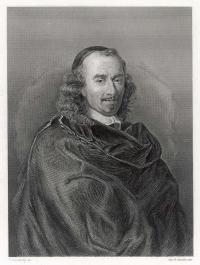
Chanson
Vos beaux yeux sur ma franchise
N’adressent pas bien leurs coups,
Tête chauve et barbe grise
Ne sont pas viande pour vous ;
Quand j’aurais l’heure de vous plaire,
Ce serait perdre du temps ;
Iris, que pourriez-vous faire
D’un galant de cinquante ans ?
Ce qui vous rend adorable
N’est propre qu’à m’alarmer,
Je vous trouve trop aimable
Et crains de vous trop aimer :
Mon cœur à prendre est facile,
Mes vœux sont des plus constants ;
Mais c’est un meuble inutile
Qu’un galant de cinquante ans.
Si l’armure n’est complète,
Si tout ne va comme il faut,
Il vaut mieux faire retraite
Que d’entreprendre un assaut :
L’amour ne rend point la place
À de mauvais combattants,
Et rit de la vaine audace
Des galants de cinquante ans.
Pierre Corneille
(1606-1684)
Chanson
• fleursdumal.nl magazine
More in: Archive C-D, Archive C-D, Corneille, Pierre
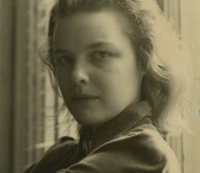
Chrysalis
1
It’s mid-September, and in the Magic Wing Butterfly Conservancy
in Deerfield, Massachusetts, the woman at the register
is ringing up the items of a small girl and her mother.
There are pencils and postcards and a paperweight–
all with butterflies–and, chilly but alive,
three monarch caterpillars–in small white boxes
with cellophane tops, and holes punched in their sides.
The girl keeps rearranging them like a shell game
while the cashier chats with her mother: “They have to
feed on milkweed–you can buy it in the nursery outside.”
“We’ve got a field behind our house,” the mother answers.
The cashier smiles to show she didn’t need the sale:
“And in no time, they’ll be on their way to Brazil or Argentina–
or wherever they go–” (“to Mexico,” says the girl,
though she’s ignored) “and you can watch them
do their thing till they’re ready to fly.”
2
I remember the monarchs my son and I brought in one summer
on bright pink flowers we’d picked along the swamp
on Yetter’s farm. We were “city folks,” eager for nature
and ignorant–we left our TV home–and left the flowers
in a jar on the dry sink in the trailer. We never noticed the caterpillars
till we puzzled out the mystery of the small black things
on the marble top–which turned out to be their droppings.
And soon, three pale green dollops hung from the carved-out leaves,
each studded with four gold beads–so gold they looked to be
mineral–not animal–a miracle that kept us amazed
as the walls grew clear and the transformed things broke through,
pumped fluid in their wings, dried off–and flew.
I gauge from that memory that it will be next month
before the girls are “ready.” I wonder how they’ll “fly”
when there’s been frost. “And they’ll come back next summer,”
the cashier says, “to the very same field–they always do.”
I’m sure that isn’t true. But why punch holes
in our little hopes when we have so few?
3
Next month, my mother will have a hole put in her skull
to drain the fluid that’s been weighing on her brain.
All summer, she’s lain in one hospital or another–
yet the old complainer’s never complained.
In Mather, the woman beside her spent a week in a coma,
wrapped like a white cocoon with an open mouth
(a nurse came now and then to dab the drool).
My mother claimed the woman’s husband was there too–
“doing what they do”–though it didn’t annoy her.
Now she’s in Stony Brook–on the eighteenth floor.
I realize I don’t know her anymore. When she beat against
the window to break through, they had to strap her down
–and yet how happy and how likeable she’s become.
When I visit, I spend my nights in her empty house–
in the bed she and my father used to share. Perhaps they’re
there. Perhaps we do come back year after year
to do what we’ve always done–if we can’t make
our way to kingdom come, or lose ourselves altogether.
Joan Murray
(1917-1942)
Chrysalis
(poem)
• fleursdumal.nl magazine
More in: Archive M-N, Archive M-N, Joan Murray

Le Balcon
Au balcon de l’hôtel, nous étions accoudées.
Et nous avions au coeur, un tel recueillement
Que la nuit et la mer, à nos pieds déployées,
Semblaient venir à nous, silencieusement.
Le ciel était si proche, au fond de l’ombre immense,
Que nos gestes semblaient atteindre l’horizon,
Les vagues se taisaient et, dans le grand silence,
Tout ce que vous disiez prenait un sens très profond.
Et voici que soudain, des voix mystérieuses
Se mirent à chanter sur la mer, devant nous,
Et les unes étaient tendres et douloureuses,
Et d’autres résonnaient comme un rire très doux.
Les voix disaient le charme et la mélancolie
De la belle rencontre et du divin hasard,
Les voix disaient l’histoire obscure de la vie,
L’angoisse des adieux, les larmes du départ.
Ah! qui saura jamais, pourquoi sous ces étoiles,
Les être dans le soir, se seront pris la main,
Au lieu de s’en aller, comme s’en vont les voiles,
Sur les flots, vers des cieux différents et lointains.
J’ai senti contre moi, votre épaule plus chaude,
Le ciel, en pâlissant, faisait vos yeux plus clairs,
Et des parfums marins de sable, d’algue et d’iode,
Se mêlaient aux parfums qu’exhalait votre chair
Emilienne d’Alençon
(1869-1946)
Le Balcon
Août 1917
• fleursdumal.nl magazine
More in: Archive A-B, Archive A-B, d'Alençon, Émilienne
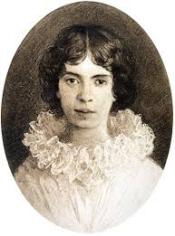
A Syllable
Could mortal lip divine
The undeveloped freight
Of a delivered syllable,
’T would crumble with the weight.
Emily Dickinson
(1830-1886)
A Syllable
• fleursdumal.nl magazine
More in: Archive C-D, Archive C-D, Dickinson, Emily
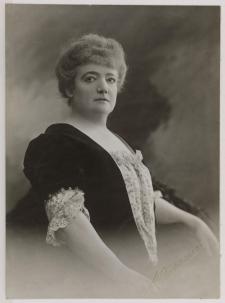
Sérénade printanière
Hier comme aujourd’hui, ce soir comme demain,
Je t’adore !
Quand je vois ton regard, quand je frôle ta main,
C’est l’aurore !
Qui donc nous avait dit que le monde est méchant,
Que l’on souffre,
Que la vie est un pont qui tremble, se penchant
Sur un gouffre ?
Où donc sont les ennuis, les erreurs, les dangers,
Les désastres ?
Avril gazouille et rit dans les tendres vergers
Fleuris d’astres !
Le sombre hiver a fui ; le radieux printemps
Nous délivre.
Viens mêler à mes pleurs tes baisers haletants ;
Je veux vivre !
Nos coeurs sont confondus, nos âmes pour toujours
Sont unies ;
Nous avons épelé le livre des amours
Infinies !
Et je ne vois plus rien que l’éclair de tes yeux
Pleins de fièvres…
Viens ! je veux soupirer les suprêmes aveux
Sur tes lèvres !…
Augusta Holmès
(1847 – 1903)
Sérénade printanière
• fleursdumal.nl magazine
More in: Archive G-H, Archive G-H, CLASSIC POETRY

Uit het dagboek van een prinses
Wij weten van dit land dat het bestaat,
en denken van dit volk dat het graag leeft.
Het heeft merkwaardige mensen.
Sommige maken wandelingen van uren
in een draaideur. Andere zwaaien
naar schaduwen. Er zijn er zelfs die lezen.
Ik was in een winkel waar je zomaar
sigaren kunt kopen. In doosjes.
En wat me telkens toch weer opvalt:
Er zijn weinig zwervers zonder hond.
Bert Bevers
Ongepubliceerd
Bert Bevers is a poet and writer who lives and works in Antwerp (Be)
• fleursdumal.nl magazine
More in: Archive A-B, Archive A-B, Bevers, Bert

Lied der Liebe
Engelfreuden ahndend, wallen
Wir hinaus auf Gottes Flur,
Daß von Jubel widerhallen
Höhn und Tiefen der Natur.
Heute soll kein Auge trübe,
Sorge nicht hienieden sein,
Jedes Wesen soll der Liebe
Frei und froh, wie wir, sich weihn!
Singt den Jubel, Schwestern, Brüder,
Fest geschlungen, Hand in Hand!
Hand in Hand das Lied der Lieder,
Selig an der Liebe Band!
Steigt hinauf am Rebenhügel,
Blickt hinab ins Schattental!
Überall der Liebe Flügel,
Hold und herrlich überall!
Liebe lehrt das Lüftchen kosen
Mit den Blumen auf der Au,
Lockt zu jungen Frühlingsrosen
Aus der Wolke Morgentau,
Liebe ziehet Well’ an Welle
Freundlich murmelnd näher hin,
Leitet aus der Kluft die Quelle
Sanft hinab ins Wiesengrün.
Berge knüpft mit ehrner Kette
Liebe an das Firmament,
Donner ruft sie an die Stätte,
Wo der Sand die Pflanze brennt.
Um die hehre Sonne leitet
Sie die treuen Sterne her,
Folgsam ihrem Winke gleitet
Jeder Strom ins weite Meer.
Liebe wallt durch Ozeane,
Durch der dürren Wüste Sand,
Blutet an der Schlachtenfahne,
Steigt hinab ins Totenland!
Liebe trümmert Felsen nieder,
Zaubert Paradiese hin,
Schaffet Erd und Himmel wieder –
Göttlich, wie im Anbeginn.
Liebe schwingt den Seraphsflügel,
Wo der Gott der Götter thront,
Lohnt die Trän’ am Felsenhügel,
Wann der Richter einst belohnt,
Wann die Königsstühle trümmern,
Hin ist jede Scheidewand,
Biedre Herzen heller schimmern,
Reiner, denn der Krone Tand.
Laßt die Scheidestunde schlagen,
Laßt des Würgers Flügel wehn!
Brüder, drüben wird es tagen!
Schwestern, dort ist Wiedersehn!
Jauchzt dem heiligsten der Triebe,
Den der Gott der Götter gab,
Brüder, Schwestern, jauchzt der Liebe,
Sie besieget Zeit und Grab!
Friedrich Hölderlin
(1770 – 1843)
Lied der Liebe
Gedicht
(Zweite Fassung)
• fleursdumal.nl magazine
More in: Archive G-H, Archive G-H, Hölderlin, Friedrich
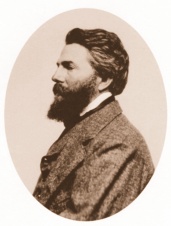
Formerly A Slave
The sufferance of her race is shown,
And retrospect of life,
Which now too late deliverance dawns upon;
Yet is she not at strife.
Her children’s children they shall know
The good withheld from her;
And so her reverie takes prophetic cheer–
In spirit she sees the stir.
Far down the depth of thousand years,
And marks the revel shine;
Her dusky face is lit with sober light,
Sibylline, yet benign.
Herman Melville
(1819 – 1891)
Formerly A Slave
• fleursdumal.nl magazine
More in: Archive M-N, Archive M-N, Herman Melville
De befaamde en onsterfelijke Franse schrijver Boris Vian zit op het terras van Café La Coupole in Parijs, een plek waar schrijvers en kunstenaars graag vertoeven.
 Zijn oog valt op een bericht in de krant. ‘Bij het plaatsje Montaillou heeft een beer de wolven verjaagd die het 17-jarige herderinnetje Claire Soubirous dreigden aan te vallen. De beer liet het meisje met rust.’ Boris leest het summiere bericht drie keer. Het ontroert hem. Beren zijn z’n lievelingsdieren. Ze hebben het uiterlijk van knuffels en het innerlijk van prijsvechters. Zal hij een boek kunnen schrijven met in de hoofdrol een beer? Een beer met menselijke eigenschappen, zoals kinderen hun knuffelberen zien als hun beste vriendjes en met hen praten?
Zijn oog valt op een bericht in de krant. ‘Bij het plaatsje Montaillou heeft een beer de wolven verjaagd die het 17-jarige herderinnetje Claire Soubirous dreigden aan te vallen. De beer liet het meisje met rust.’ Boris leest het summiere bericht drie keer. Het ontroert hem. Beren zijn z’n lievelingsdieren. Ze hebben het uiterlijk van knuffels en het innerlijk van prijsvechters. Zal hij een boek kunnen schrijven met in de hoofdrol een beer? Een beer met menselijke eigenschappen, zoals kinderen hun knuffelberen zien als hun beste vriendjes en met hen praten?
Hij pakt een lijntjesschrift uit zijn tas en schroeft de dop van zijn pen. Opeens is het er weer, na lange jaren, het geluk van het schrijven. Het eerste hoofdstuk waarin de beer, die Napoleon heet, en Claire besluiten op reis te gaan naar Parijs, vloeit als vanzelf op het papier.
Aan zijn tafeltje op het terras van La Coupole schrijft Boris elke dag een hoofdstuk, vaak in het bijzijn van schrijvers en lezers. Een van hen is de schrijver Ton van Reen, een bewonderaar van het werk van Boris Vian, die een dagboek bijhoudt over de gebeurtenissen. Al vlug ontdekt men dat wat Boris schrijft ook in het echt gebeurt. De pers duikt erop. Frankrijk staat op zijn kop. De toekomst van het land vloeit uit de pen van Boris.
Quotes uit de Franse pers:
‘Tja, wat moet ik er van zeggen? Een roman over de liefde? Onzin natuurlijk. Maar het leest lekker weg. En dat ik een rol speel in een boek van Boris Vian? Dat streelt me wel natuurlijk.’ – Michel Houellebecq in Le magazin Houellebecq
‘Boem. Pats. Zo kennen we Boris Vian weer. IJzersterk in het absurde. En toch heel geloofwaardig, ook omdat het leven van de mens nu eenmaal ongerijmd is. Een boek waarin ik van de eerste tot de laatste letter geloof. Ontroerend is de kleine rol die facteur Ferdinand Cheval speelt in dit heerlijke verhaal, waarin ook ik op mijn plaats word gezet.’ – Jean Paul Sartre in L’Echo du Cimétière de Montmartre
‘Iedere goede roman is een dwaalspoor door het leven. Dit is zo’n roman. Een waar doolhof waar je niet uit wilt raken, een tuin vol verhalen en sprookjes. Ik zit er nog middenin.’ – Françoise ‘Tristesse’ Sagan in L’heure du Femme de Campagne
Aad Nuis schreef in de Haagsche Post: ‘Ton van Reen is een schrijver met karakter. Hij gaat zijn eigen weg, los van de wisselingen van de literaire mode. Hij schrijft graag sprookjes, waarbij de toon onverhoeds kan omslaan van Andersen op zijn charmantst in Grimm op zijn gruwelijkst.’
Vlucht uit Montaillou is zo’n sprookje.
Ton van Reen
Vlucht uit Montaillou
De reis van Claire en Napoleon naar Parijs
Boris Vian-roman
ISBN 978-90-6265-504-5
Eerste uitgave 14 juli 2019
Gebrocheerd in omslag met flappen,
438 blz.
€ 22,00
• fleursdumal.nl magazine
More in: # Music Archive, - Book News, - Book Stories, Archive Q-R, Archive Q-R, Archive U-V, Art & Literature News, Reen, Ton van, Ton van Reen, Vian, Boris
Eigen Wijs bevat vijftig korte en zeer korte verhalen waarin de achtenzeventigjarige schrijver Ton van Reen terugkijkt op zijn leven en het korte pad verkent dat hem nog wacht.
 Hij beseft dat de verhalen die hij vroeger hoorde van zijn in 1876 geboren grootmoeder Jaantje van Asperen, dochter van een turfschipper uit de Peel, hem hebben gevormd tot schrijver en verteller. Tijdens het kaarten aan de keukentafel riep zij de wonderen van de wereld in hem op. Daarom komt zij veel voor in deze verhalen. Net als zijn moeder, die al heel jong weduwe werd. En de vader die stierf toen Ton tien jaar oud was.
Hij beseft dat de verhalen die hij vroeger hoorde van zijn in 1876 geboren grootmoeder Jaantje van Asperen, dochter van een turfschipper uit de Peel, hem hebben gevormd tot schrijver en verteller. Tijdens het kaarten aan de keukentafel riep zij de wonderen van de wereld in hem op. Daarom komt zij veel voor in deze verhalen. Net als zijn moeder, die al heel jong weduwe werd. En de vader die stierf toen Ton tien jaar oud was.
De verhalen springen op en neer, van vroeger naar nu, van het eigenzinnige meisje uit de Peel dat grootmoeder werd, van de moeder die haar eigen weg ging, van het kind dat Ton zelf was naar de grootvader die hij nu is. Samen vormen de verhalen het levenspad van de schrijver. Het zijn verhalen over een wereld die totaal is veranderd, over de jaren vijftig waarin hij in Limburg opgroeide, waarin de kerk nog absolute macht had, tot de tijd van nu, waarin diezelfde kerk een achterhoedegevecht levert. De jaren waarin de heren met de hoeden en de vrouwen met de bontjes, samen met de pastoor, in het dorp de dienst uitmaakten.
Maar er zijn ook verhalen over het avontuur van het lezen, de kunst van het vertellen en de voldoening van het schrijven, tegen de stroom in, vanaf het kleine zolderkamertje waar Ton sliep als kind en waar hij zijn schrijftafeltje had, tot op de dag van vandaag, in zijn werkplaats, de voormalige koeienstal, vol duizenden boeken.
Deze verhalen sluiten naadloos aan bij de eerdere boeken die Ton van Reen schreef over de jaren vijftig, zoals Het winterjaar, In het donkere zuiden, Thuiskomst en Roomse meisjes. Eigen Wijs past prima bij het thema van de Boekenweek 2020: ‘Rebellen en dwarsdenkers.’ Bij uitgeverij In de Knipscheer verschenen van Ton van Reen onder meer De verdwenen stad, Dochters, De Lichtverkoper en Vlucht uit Montaillou.
Ton van Reen
Eigen Wijs
Korte verhalen
Nederlands
Gebrocheerd in omslag met flappen
200 blz.
ISBN 978 90 6265 790 2
NUR 303
Eerste druk 2020
Uitgeverij In de Knipscheer
• fleursdumal.nl magazine
More in: - Book News, - Book Stories, Archive Q-R, Archive Q-R, Art & Literature News, Reen, Ton van, Ton van Reen
De E. du Perronprijs 2019 is toegekend aan Ellen Deckwitz voor haar bundel Hogere Natuurkunde (Uitgeverij Pluim).
De jury bekroont een fascinerende en onheilspellende dichtbundel, waarin verschillende genres, stemmen en stemmingen met elkaar worden verweven. De andere genomineerden waren Stephan Enter (Pastorale) en Asha Karami (Godface).
 Aan het woord is een kleindochter die de stem van haar grootmoeder laat klinken en haar oorlogservaringen in Nederlands-Indië onder woorden probeert te brengen.
Aan het woord is een kleindochter die de stem van haar grootmoeder laat klinken en haar oorlogservaringen in Nederlands-Indië onder woorden probeert te brengen.
Het levensverhaal wordt alleen in flarden verteld. Deckwitz’ verhalende poëzie laat zien hoe families getekend worden door een land van herkomst dat werd verwoest. Het leed en de veerkracht, ingewikkeld met elkaar verbonden, blijven bestaan in elkaar opvolgende generaties. Dit is een bundel die in een tijd van mondiale crisis troost en relativering biedt.
De prijs bestaat uit een geldbedrag van 2500 euro en een textielobject, ontworpen door studio ‘by aaaa’ (Moyra Besjes en Natasja Lauwers) en vervaardigd bij het TextielMuseum in Tilburg.
De uitreiking is uitgesteld naar het najaar en vindt plaats op 15 oktober 2020, aanvang 20.00 uur in de LocHal aan de Burgemeester Brokxlaan 1000 in Tilburg. Voorafgaand aan de uitreiking houdt Maxim Februari, winnaar van de P.C. Hooft-prijs 2020, de negende E. du Perronlezing met als titel ‘E. du Perron en de pseudo-identiteiten’.
De E. du Perronprijs is een initiatief van de Gemeente Tilburg, de Tilburg School of Humanities and Digital Sciences van Tilburg University en Kunstloc Brabant. Vorig jaar won Jan Leyers de prijs voor zijn boek Allah in Europa. Eerdere laureaten waren onder meer Margot Vanderstraeten (2017), Stefan Hertmans (2016) en Ilja Leonard Pfeijffer (2015).
Voor tijden, programma en aanmelding, zie www.kunstlocbrabant.nl/eduperron2019
Hogere natuurkunde
Auteur: Ellen Deckwitz
Uitgever: Uitgeverij Pluim
Taal: Nederlands
Hedendaagse poezie
Bindwijze: Paperback
Druk 1
September 2019
Aantal pagina’s: 80
EAN 9789492928054
NUR code 301
EUR 21,99
• fleursdumal.nl magazine
More in: #Editors Choice Archiv, - Book News, Archive C-D, Archive C-D, Awards & Prizes
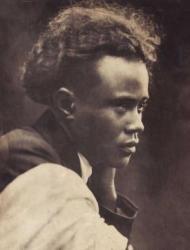
Lilas
Ce n’est pas seulement l’annonce printanière
en cette terre où l’arbre a toujours sa verdure
et dédie à l’amour fleuri de la lumière
sa cime qui résiste à la grande froidure,
ni l’union au bleu rose des crépuscules
du mauve parfumé qui jaillit de ta sève,
que m’apportent, ce soir, tes primes panicules,
ô lilas où la nuit fait retentir son rêve !
Plus encor, la saison ranime en ma mémoire
les plaisirs que j’avais sous ta frondaison noire
à deviser avec mes amis en-allés !
Et suscitée, hélas ! par ta seule venue,
ma jeunesse surgit, découronnée et nue,
de ton ombre où j’entends quels appels désolés !
Jean-Joseph Rabearivelo
(1901? 1903? – 1937)
Lilas (poème)
• fleursdumal.nl magazine
More in: #Editors Choice Archiv, Archive Q-R, Archive Q-R, Jean-Joseph Rabearivelo
Thank you for reading Fleurs du Mal - magazine for art & literature